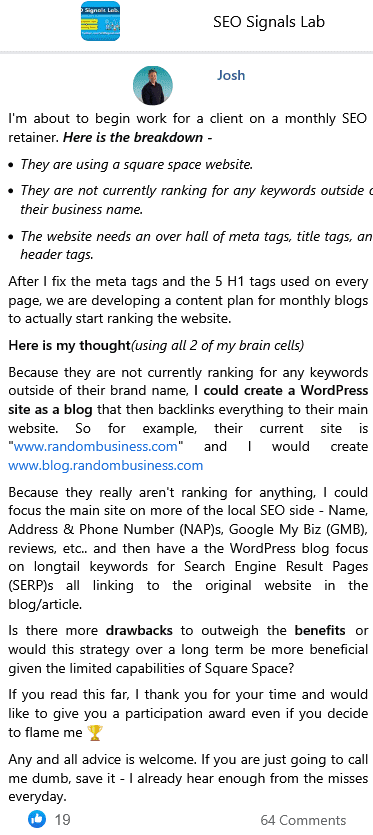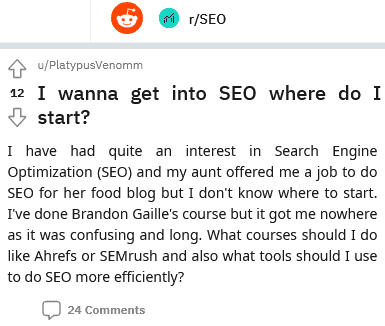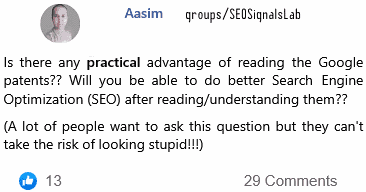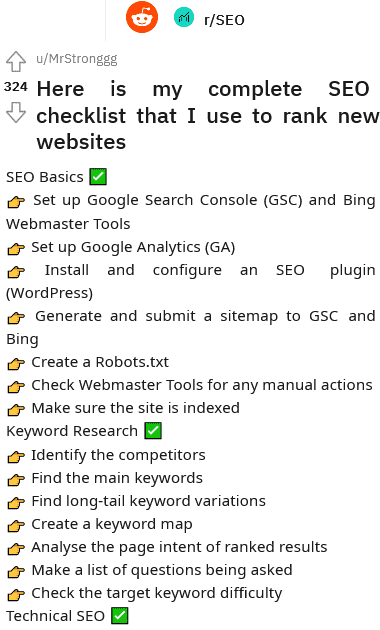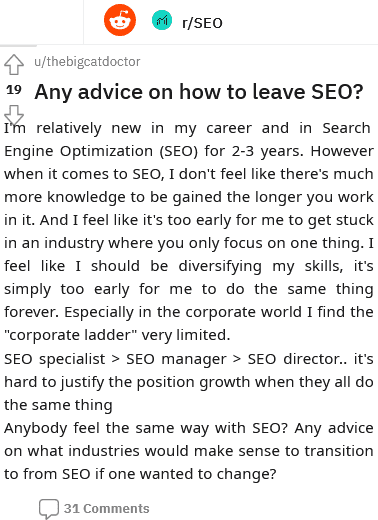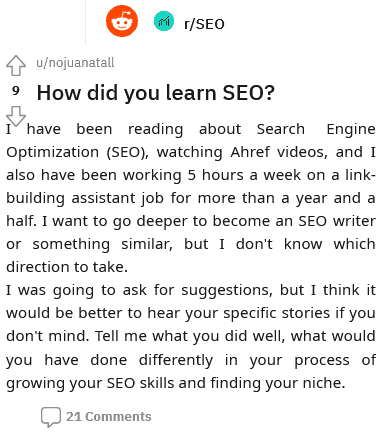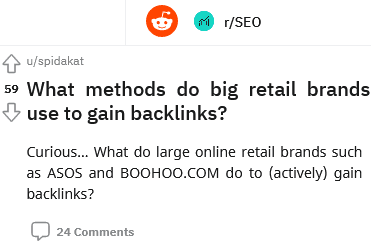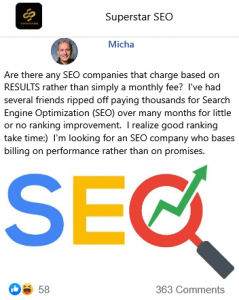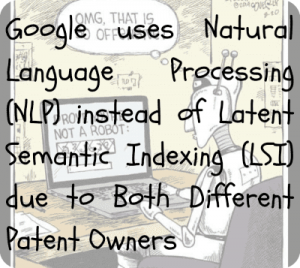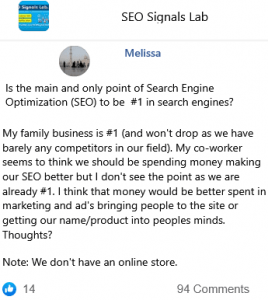I'm about to begin work for a client on a monthly SEO retainer. Here is the breakdown –
They are using a square space website.
They are not currently ranking for any keywords outside of their business name.
The website needs an over hall of meta tags, title tags, and header tags.
After I fix the meta tags and the 5 H1 tags used on every page, we are developing a content plan for monthly blogs to actually start ranking the website.
Here is my thought(using all 2 of my brain cells)
Because they are not currently ranking for any keywords outside of their brand name, I could create a WordPress site as a blog that then backlinks everything to their main website. So for example, their current site is "www.randombusiness.com" and I would create www.blog.randombusiness.com
Because they really aren't ranking for anything, I could focus the main site on more of the local SEO side – Name, Address & Phone Number (NAP)s, Google My Biz (GMB), reviews, etc.. and then have a the WordPress blog focus on longtail keywords for Search Engine Result Pages (SERP)s all linking to the original website in the blog/article.
Is there more drawbacks to outweigh the benefits or would this strategy over a long term be more beneficial given the limited capabilities of Square Space?
If you read this far, I thank you for your time and would like to give you a participation award even if you decide to flame me 🏆
Any and all advice is welcome. If you are just going to call me dumb, save it – I already hear enough from the misses everyday.
19 👍🏽19
📰👈
Typically you wouldn't use www *and* another subdomain like 'blog'. If the main site were
https://www.domain then the blog would be https://blog.domainDepending on rankings via the blog, and not the product and business pages depends on being able to do one extra step, of getting them from the Search Engine Result Page (SERP) to the blog, then from the blog to the product/service pages. It can certainly work, but it is still something to consider.
Meta tags are largely irrelevant to current Search Engine Optimization (SEO), especially with Google so often rewriting descriptions, and even Titles depending on the exact search made where the page is a result. Titles and H tags at least have some effect, but it's kind of absolute baseline.
You'll need to think hard about how to promote the overall importance of the site in Google's idea of the 'map' of the market and topic. Is the blog the main way you intend to get links, and if so, do you have a content strategy for that?
The blog will be centered around user search intent. Providing real value to readers with a Call to Action (CTA) based on the product. Driving traffic via long tail keywords that satisfy user query. Their current SEO hasn't produced a single blog in 4 months. They only rank for one keyword and that's their name. So I'm developing a content strategy plan to begin to expand that horizon.
Also, I 100% trust what you are saying about baseline SEO, but there is some other research I've been reading on the importance of keywords in meta title tags and their impact. But if this were you, what would be your approach? I am incredibly grateful for your help. Link to study:
https://firstpagesage.com/SEO-blog/the-google-algorithm-ranking-factors/The 2022 Google Algorithm Ranking Factors
Ammon Johns 🎓 » Josh
The problem with correlational studies is that they attempt to guess which common things have an effect without any accounting for which things are just common and coincidental.
Obviously, anything that is 'baseline' for SEO is going to be the most used, most often seen thing in a correlation study.
Let me illustrate: the robots meta tag is a part of the robots EXCLUSION protocol. You never ever need to tell the robot to "index" as this is its default behaviour, you *should* only use the tag to *exclude* actions from its normal behaviour.
One of the most widespread blog plugins is the Yoast SEO plugin for WordPress. That plugin by default puts in an utterly useless meta tag that tells the robots to "index,follow", which has absolutely no purpose, and no effect.
But if you were to do a correlation study, because that plugin is widely used by people who care about their rankings, it will show that many high-ranking sites (the people who cared enough to install an SEO plugin) have that tag in their pages, thus the study concludes it is important to rankings …
If I could convince all SEO users, and only SEO users, that having a purple banner improved their rankings, and they all tried it out, and we did a correlation study a month later, that purple banner would correlate with a massive amount of the highest ranking pages, even though I made the whole thing up and it does nothing.
💟8
Josh ✍️ » Ammon Johns
Jeez man you are kinda turning my world upside down right now lol. If you could tell a rookie like myself in short, brief terms as to whats the most important thing(s) to focus on, what would consider them?
Ammon Johns 🎓 » Josh
The user intent is certainly key, as that will help you nail 2 parts of the algorithms – content and intent.
But the third part in almost every case is links. Links are what tells Google a page is connected, that at least some of the roads on the huge map of the internet go there. The quality and importance of *who* links to it, (i.e. what the other end of that road to your property comes *from*, is it a big city, or a small farmhouse?), also counts a lot.
You kind of need all three factors to rank for anything, and while anyone can copy your content, or summarise it and rewrite it close enough that yours is no longer as special, and the query intent applies to every listing in the SERP, your links are the one thing that, done right, are impossible to copy, and set you apart.
Links don't just matter to ranking either. That same determination of overall 'importance' is a factor in crawl priority, so directly affects how quickly your content gets crawled, refreshed, and even how much content can be crawled in a given time (which affects how much of the content of a site can stay indexed).
So it is imperative that right from the start, you plan out exactly how you are going to get quality links to the site. Otherwise all the content creating in the world might not even get indexed, or stay indexed.
Early on, while a site is still relatively small, the search engines will take almost any content from that site. But if the content it has taken doesn't perform well, doesn't seem to offer anything that a thousand other similar pages offered to the end user, it lowers the priority of taking any more.
That means your content that gets links, that gains importance for the site, needs to be a constant part of that early growth, or the growth itself will be stifled.
Josh ✍️
I can't thank you enough for all of this information. Let me know if there is anything I can do to help you out.
Ammon Johns 🎓 » Josh
myself and Stockbridge are big, big believers in the 'Pay It Forward' mentality. Help out the next person you can and we're square.
Josh ✍️
Thank you. I had one last question that's stumping me. This business is really the first of its kind. I'm looking to build a content strategy plan based around 1 of the 4 types of user search intent. The business I am going to work with provides QR codes to business owners for "x" amount a month and customers can scan the QR to then have geofenced access to different types of media for 48 hours. My question is if they are targeting places like salons, hospitals, dentists, should I be using an informational search intent to gather my keywords? Let's pretend the search term is "How to increase sales in salons" and I then write a blog based around sales tactics they could use and how this QR code product can help keep customers coming back. Would that be a good approach for trying to satisfy user intent?
Ammon Johns 🎓 » Josh
The whole '4 types of intent' thing is a very, very broad-brush generalization. When actually getting into content you want to be way, way more granular.
80% of all search is informational we've always been told since the first breakdowns, but 'information' is not an intent in any useful way. Instead we really have to break it down much more cleverly.
Take something like "How to install a Yale type lock" as a query. Yes the obvious is that they want to know how to install a lock. The obvious that many miss is that this is an anti-commercial query – it is not that this person doesn't know that both carpenters and locksmiths exist, or that they could hire one. They are really asking "How do I avoid hiring a professional to install this lock"
Telling them they could hire a professional is not serving their intent, even though it would be the simplest way to ensure the lock was fitted correctly. Yet time and time again I see marketing agencies and SEO agencies trying to target anti-commercial SEO queries with a sales pitch.
(There are a LOT of ways to leverage and profit from anti-commercial search, but not like that.
https://web.archive.org/web/20130911072745/http://www.isoosi.com/blog/anti-commercial-queries-money-in-anti-commerce.html )Try to dig deeper and think of all the possible motivations, even emotional needs or concerns, behind a search, especially with the broader or less ultra-specific queries. Someone looking for information on "health insurance policies" may have a lot of different specific motivations. Maybe they want guidance on the features they need, maybe on what features they can maybe skip to save money, maybe on which providers are reliable, maybe pricing guides, or maybe they already have a policy and want to know if it is a good one compared to others on the market. Those are all very different.
Strategy matters a lot here. That starts out with the broad business strategy, not the SEO strategy. If your QR code client has clear and demonstrable advantages over rival products/services then they can go for the queries near the point of decision, where people are already aware of what QR codes are and are just looking for a provider … But if the business isn't quite that lucky to have a clear and wide margin of advantage, they'd really be wanting to target people much earlier in their process of deciding how they can do something where the QR codes would be an option they probably haven't even considered.
Understand that almost all purchases, and certainly all large or first purchases, tend to have a whole process to the shopping and decision making, and for something like a business and marketing decision, that process may extend over weeks or even months.
This should help with the fundamental principles of handling a shopping process, and deciding where to step in, and with what kind of content:
https://web.archive.org/web/20130906140935/http://www.isoosi.com/blog/how-people-shop.htmlAnti-Commercial Queries – the money in anti-commerce
Josh ✍️
You are seriously impressive. Search Engine Optimization (SEO) is such a difficult thing to explain to someone who doesn't understand the first thing. The way you explained that with an example, anyone can understand.
The biggest thing we try to provide to our clients is education with an action plan. Laying out what we plan to do and how we are going to do it. People hire marketers, like ourselves, because they don't understand complex digital marketing strategy. Being able to effectively explain SEO to where a 6 year could understand is a serious skill. It's something I've always struggled with. I suppose the more you learn and apply the knowledge, the better you can explain it.
Thank you again for your shared knowledge and expertise.
🤔
Ammon Johns 🎓 » Josh
Thank you, and you're welcome.
Josh ✍️ » Ammon Johns
You have a standing offer from me to help you out wherever I can so I can learn from an actual expert.
Ammon Johns 🎓 » Josh
I always say that there are no experts in the absolute sense. Information Retrieval itself is changing so fast, so continually, then the subset of that which is web search changes in some way almost weekly, and Search Engines are not the only platforms or technologies we have to keep up with.
I regard myself instead as simply a student who's been studying a little longer than most, and willing to help them with their homework. 😃
💟2
📰👈
Marco
If they give you access to the squarespace site you can work on that one adding content as well and inner linking everything, squarespace isn't bad for Search Engine Optimization (SEO). It's as bad as you make it out to be.
Good point. I don't hate it but because I use WP for everything and I can navigate a WP site blindfolded, it's just a preference.
Marco » Josh
At the end of the day it's an editor like any wp theme would be, just create a post/page, add a title, add content, add a link, done deal. It'd be more work to build the wp website and you'll still end up with a subdomain with 0 juice (if it has any).
Josh ✍️ » Marco
Thank you. Yeah it really is just more work in the long run. Might as well just make a blog section on their primary domain and go from there.
Andrew 🎓
You don't get the authority of the main domain when you use the subdomain so you will be building authority from scratch on the blog.
Yeah that's my worry. The only reason I consider it, is because they don't rank for anything anyway lol. The website is indexed, but that's really it.
Andrew 🎓 » Josh
Well, its your preferance then. I'm choosing to avoid subdomain blog on my Shopify business because I want to save money on link building and I believe product pages will have better shot ranking when I build authority to blog posts.
Bianca
I wanted to also say what Andrew said. The backlinks wont mean much if its from a low Domain Authority (DA) site. How competitive is their market? And then also, how much competitor analysis have you done? Putting legit quality content on the site might get some things happening. And then also Schema markup. You can create content silos with blogs on the current site. Lastly! I would try to swop links with other sites that might complement each other. That's all i have for you.
This is a start up business. They are the only kind of their own to anyones knowledge. Basically, it deals with geofencing and providing entertainment to customers in businesses while they wait.
Bianca » Josh
Oh damn, selling a service no one knows about is a pickle, trying to create a market… if they have satisfied clientelle, you can maybe ask them what they would have searched for trying to find this service… so what questions would they ask. And you need to answer them in your content. 🤔 I wish i had more answers for you.
Josh ✍️ » Bianca
This one is definitely stumping me. The meeting is a week away and i'm already stressing lol. I cant divulge into the business name but I can speak in tongue lol.
Bianca » Josh
I wish you the best of luck and I hope that some of my suggestions will maybe help a bit.
Josh ✍️ » Bianca
Thank you so much!
Petter
What I read:
You find squarespace hard to work with, so, you want to most likely mess up User Experience (UX), make navigation slower, make tracking harder, add extra hosting (and template?) costs and water out link strenght by adding them to a subdomain powered by WP for your ease to have content that is going to only support the conversion (which typically cater best to the money keywords) 🤔
Honestly, if Squarespace limits you this much you can try to push the client to migrate the current site over to WP (which isn't necessarily a bad idea as SS does have restrictions that could make a difference).
Working with SS is by no means going to limit or weaken what I can do. The question was more so on the lines of "Is there more cons to start a WP site from scratch vs building off of their current platform?" The answer was yes. There is little to no upside to going with the WP route.
Petter » Josh
From your answers on other threads, if it's a web based service then SS is wrong for them. If it's just for marketing a software o.s., then SS does have its disadvantages. Performance is hard to get to a high standard, design is limited, functionality limited, schema and lots of other tech SEO aspects are limited or time consuming to sort out and often the hosting is also sub-par. Which does mean you often have to compensate with more content, more links etc..
So the last aspect of what I wrote should be considered, and again – WP might not fit their needs if they're going to develop an online application of it.
Josh ✍️ » Petter
They have a company that actually handles the product delivery side of the business. What's unique about the product is you don't have to download an app. A software dev built them a browser based platform that offers users the different media sources for free at the geofenced location up to 48 hours after they leave the geofence. They want their website to be more than a place to learn about the product and fill out a form to register. They want me to come and do SEO to broaden their search visibility, keyword rankings, etc. Outside of the SS website being used to host the information, complete a form submission, and make edits or potentially blog, there is no other use to the website. Is it possible to have a subdomain pointed a WP site?
Petter » Josh
It is possible, but not recommended.
Either it's very pricy (shared resources and adjusting WP theme to SS .js and .css) or the pageload times increase on x-domain navigation (hurting conversions the most).
And from an SEO POV links going to subdomain means primary will have a harder time to rank for the stuff that'll sit there.
Jonathan » Petter
I agree. From a 360 point of view with all things considered that were mentioned, just more potential and better versatility SEO wise doing it all with WP at this point in time, in my opinion. And less confusing to work with.
📰👈
Truslow 🎓
I'm in agreement with Ammon here – but I'm going to put my response thread down here instead of inside his thread since he'll probably have more to add himself. I'll be referring to things from his thread through…
First… that SEO article that ranks factors… the mere idea that an SSL certificate is twice as important as structured data is nuts. HINT: H tags, lists, tables – those are all ways to "structure data" too, btw. And, though I don't like to use the term "keyword" the notion that having it in the URL is of equal import as having the subject of the article in the title…? And with user engagement being in the top 5 factors – ugh. I don't even know where to start. (User engagement – in the way most people think like Click Through Rate (CTR) and Bounce Rate are simply NOT ranking factors at all… period.)
In your thread with Ammon you asked what were important things… and I always say that the most important thing is to send as many positive, consistent, and accurate signals as you can. And, IMO, consistency is the key. I'd rather see something done incorrectly with absolute consistency than to see something where you get it right just sometimes. Computers are good at spotting patterns – so even if it's not ideal, if it's a pattern, the system might pick up on it. If it's just randomly right and randomly wrong – then it's going to need to go into deep analysis mode to figure out everything on the site.
So… for example, I had a client who had an h2 above the h1 on a page. It was sort of a lead in with a category call. Something like:
<h2>How To For Dummies</h2>
<h1>Proper Use of Heading Tags in and HTML Document</h1>
That's not technically correct and could be confusing – BUT… that leading h2 was ALWAYS used as a categorical classification AND it was used on EVERY page of that type on the site. It wasn't "technically" correct – but it was a consistent signal with meaning. So we kept it – and we continue to add posts in that format to this day. Did Google figure out that that leading h2 was the specific signal they were trying to send? I'm not sure… maybe. Maybe not. Google DEFINITELY figured out that the H1 was the proper H1 for the article, though – and that's the key thing. And because of that consistency, even with the mistake, blog posts go up and start ranking within hours of posting. No problem.
So… do as much as you can, but most importantly, do it consistently. That's my advice.
Thank you guys so much. I'm definitely learning a lot from all of this. There are so many differing opinions on SEO and people broadcasting information that is subjective. I at least know you and Ammon are career pro's and some of the best of the best. I will make sure to add into my notes about consistency and your example.
🤔
Davis
I've ranked squarespace sites before. With that said almost all of them saw a further ranking boost after I told them to reinvest their profits into a WP site. If the client likes squarespace for how user friendly it is I recommended they check out Duda as an alternative to WordPress
When they decided to go to WP, how did you go about keeping the rankings? Did you do a temp domain and transfer over the existing domain when ready? Or did you do a new domain and use a 301 redirect?
Daniel » Josh
Just use the same domain and the same slugs on WordPress as you have them in squarespace. When that is not possible, use 301s. But do not switch the domain. And i agree with someone who mentioned this above, avoid using a subdomain for the blog. You're making your life unnecessarily complicated. Just use the SS blog functionality until you can convince them to migrate the entire website to WP. You have a lot of room to grow in terms of SEO even on a crappy platform like SS.
Focus on great content and build links to it.
Once you've covered the basics and started seeing some ranking, show your progress to the client, and explain why they need to move to WP.
Cheers!
Davis » Josh
Wp dev environment, map the urls with a before and after via screaming frog. Double check Google Search Console (GSC)Google Analytics (GA) and Ahrefs for any urls you may have missed. Also make sure no squarespace redirects are lost. If possible make the site a direct wp clone but chances are a new site would be better than a squarespace mimic.
What I learned in hindsight is to tell the client up from to get off squarespace. If they say no it means they are cheap and not worth it (they will cheap out on you first chance). Doing SEO on squarespace is like being a lawyer to someone on drugs during their trial. You may win but your making it unnecessarily harder.
Lucian
You should first do the strategy then work on optimizing the title tags. As part of your content strategy you should start with the users. Which keywords they're looking for when they're looking to hire/buy? Those are the bottom of the funnel and you should prioritize them. After you figured that part out then start by revamping the current pages based on your research.
You can either work on the Squarespace or redo the entire site on WordPress. Don't create a subdomain for the blog as it will put both the subdomain and the main domain at great disadvantage.
Cory
Step 1: Leave square space
Step 2: get link structure
Step 3: build a real website with proper page and posts
Step 4: Invest hard for 6 months with the right strategy.
Step 5: profit
I couldn't agree more. Unfortunately, it's a startup company that's invested A LOT of money into the website to just be built… and some marketing company I won't name that provided them with an Ubersuggest report with keyword tracking that had 0 relevancy to the pages they were intending to rank.
I was helping a friend who works there with some basic on page SEO stuff. Found they had 5 H1 tags on their homepage and then dove into the website to find they were getting screwed.
Cory » Josh
So your value is those quick wins on page. Find those and get them on a velocity of hat excites them so you can pitch the rebuild. Seems like they really need you.
Josh ✍️ » Cory
Great point. I think as their business starts to accelerate, that's a viable option in the future. And redoing their website wouldn't even be difficult considering they already have their design and base content down. The only downside is losing some of the traction made with Search Engine Optimization (SEO) with a new build. I suppose there are some thing that can be done to lessen the impact of ranking drops with a thought out plan.
Cory » Josh
So final analysis: do you really have traction. Handing the link structure to a new Content Management System (cms) is no risk if you do it correctly. Bounce quick. Make something you can pitch them on.
Josh ✍️ » Cory
As of now, their only traction is a SS site that's has 10 organic visitors a month. I have never personally handled a cms transfer. Would you happen to have any resources you could possibly provide me if they bite on a WP build?
Cory » Josh
this community is full of the best of the best. Search the group for similar conversation. Steven Kang can weigh in here. We don't solicit business in the group. Some good resources are available through the group query. 😁
Keith L Evans 🎓
For the love of God, please just replace Squarespace. So much more success and the customer will be much happier.
Lmao you are telling me. I wish I could have gone a year back before they built the site and warned them. I hate SS but willing to work on. I've developed dozens on dozens of WP sites and just would rather not work on SS
📰👈
